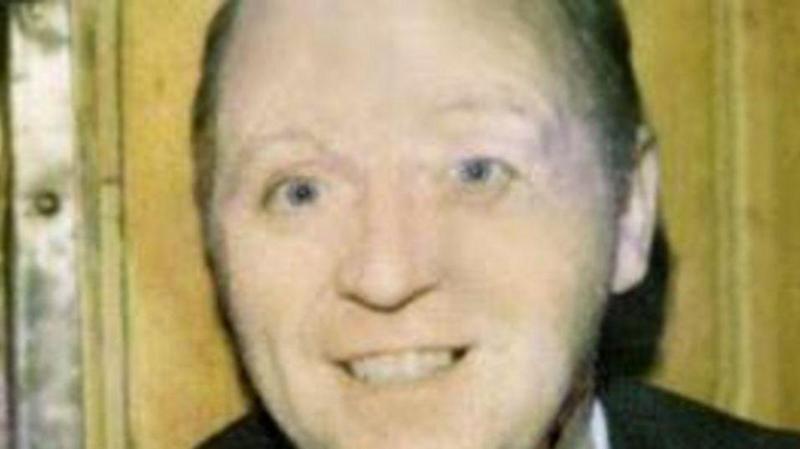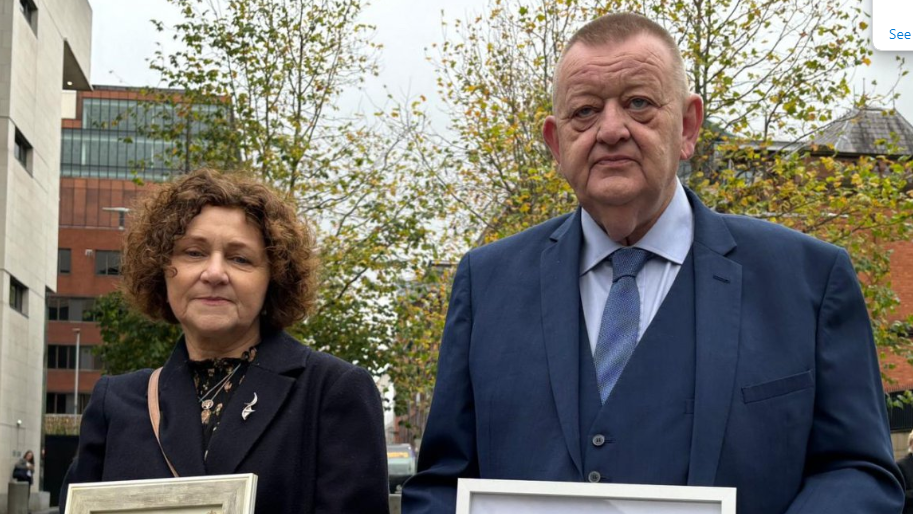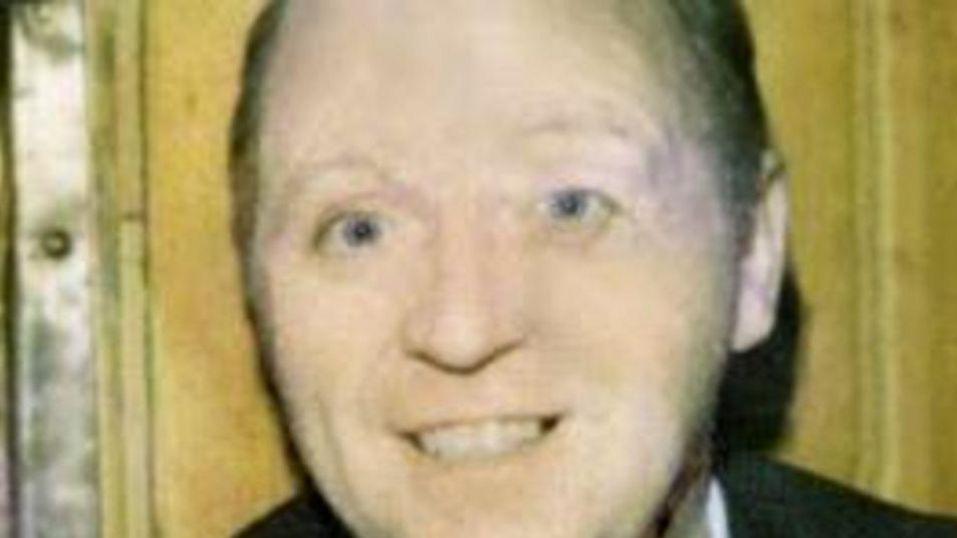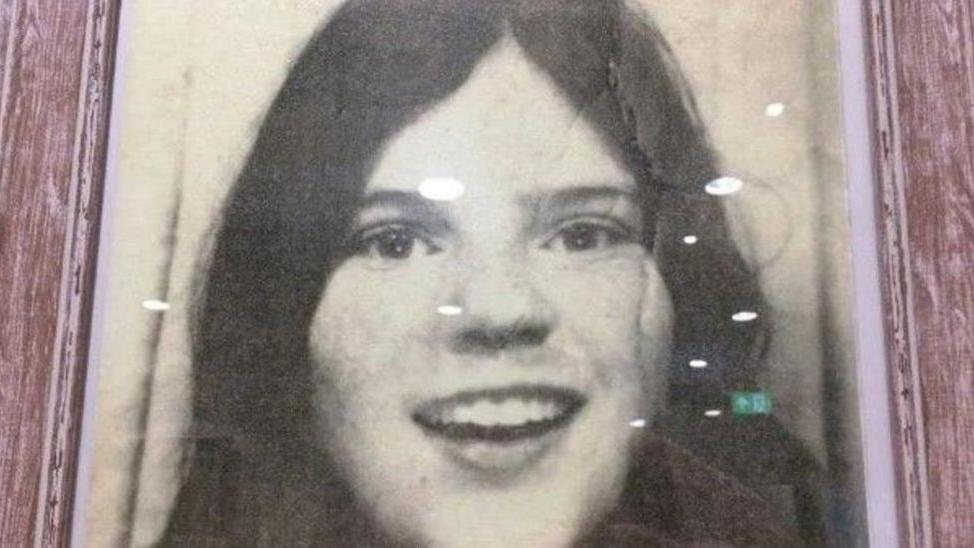Family of man shot by soldier awarded 'significant' sum

William McGreanery was 41 when he was shot
- Published
The family of a man who died after being shot by a British soldier more than 50 years ago in Londonderry have been awarded a "significant financial settlement".
William McGreanery, 41, died on 15 September 1971, after a soldier opened fire from an Army observation post overlooking the Bogside.
The family cannot disclose the amount they received due to a confidentiality clause.
Mr McGreanery’s nephew Billy said the settlement reflected the “death, pain, anguish and sorrow” that the Ministry of Defence (MoD) had inflicted on the family.
The MoD has been approached for comment.
Mr McGreanery, a shop assistant, was shot after a member of the 1st Battalion Grenadier Guards – known as Soldier A - opened fire from an Army sanger overlooking the junctions of Eastway, Lone Moor Road and Westland Street.
In June 2011, the Historical Enquiries Team (HET) found he "was not carrying a firearm and he posed no threat to the soldiers".
In interviews with the HET, Soldier A denied that he had shot Mr McGreanery in revenge for the earlier murder of a soldier and insisted it had been a spur of the moment response to a perceived threat.
He told the HET he accepted he had made a mistake that night, but that it had been an honest one.
Later that year, the chief of the general staff of the Army sent an official apology to the McGreanery family and in 2013 an apology was also made by the armed forces minister, Andrew Robathan, in the House of Commons.
Earlier this year, Northern Ireland's Attorney General ordered a fresh inquest into the death of William McGreanery.
That direction came a day after the Public Prosecution Service (PPS) said there was insufficient evidence to prosecute the soldiers suspected of shooting him dead.
The PPS has confirmed that that decision is currently being reviewed by a senior public prosecutor following a request from the McGreanery family.
The PPS said it would "engage directly" with the family when this process is complete.
'Unjustified and unjustifiable'
In a statement, Mr McGreanery’s nephew Billy, who was 13 when his uncle was killed, said the family would continue to pursue justice.
“I liken this process to a three-course meal that we fought very hard for and earned,” he said.
“The starter was the apologies for the wrongful killing of Billy, and today is the dessert, financial retribution.
“But they skipped the main course – justice… the PPS review puts the justice we crave firmly on the plate, and only a prosecution will satisfy our need for the justice we rightly deserve.”

Mr McGreanery's niece, Marjorie Roddy, and nephew, Billy McGreanery, outside the court in Belfast on Thursday
The McGreanery family solicitor Gary Duffy said the settlement announced on Thursday was “long overdue” but also a “welcome endorsement of the family’s campaign to uncover the truth”.
He said Mr McGreanery’s killing had been “unjustified and unjustifiable” adding that the case “highlights the value and merit of such legacy civil actions in truth recovery and obtaining justice”.
Mr Duffy added: “Furthermore, it exemplifies the need to move beyond the Legacy Act and its bar to prosecutions and inquests.
“We look forward to the reinstatement of the family’s inquest and for a decision on the prosecution of the soldier who shot and killed Billy.”
'Scale of injustice'
The Social Democratic and Labour Party’s MP for Foyle, Colum Eastwood, said the McGreanery family had been “steadfast in their campaign for truth, justice and accountability”.
“Today’s settlement is undoubtedly good news for the family and vindicates their decades-long campaign," he said.
"Unfortunately, however, it does not deliver the justice they are entitled to and have fought so long to secure.”
He said the case highlighted “the scale of injustice that the Tory Legacy Act threatened to inflict on families across our society”.
Who brought Troubles-related inquests to an end?
All historical inquests arising from the Troubles in Northern Ireland were shut down when the Conservative government passed its Legacy Act in September 2023 despite opposition from Labour, all Northern Ireland parties, several victims' groups and the Irish government.
The Labour government has pledged to repeal most aspects of the controversial act but the legacy body known as the Independent Commission for Reconciliation and Information Recovery (ICRIR) will stay in place.
It has taken over all Troubles-era cases from 1 May 2024, including those on the desk of the Police Service of Northern Ireland (PSNI).
The act's most controversial element, the offer of conditional immunity to suspects, was dropped following legal action by bereaved families.
The court ruled this part of the act was incompatible with human rights' legislation and the Windsor Framework.
- Published30 April 2024

- Published29 April 2024
